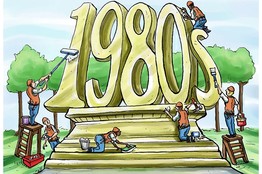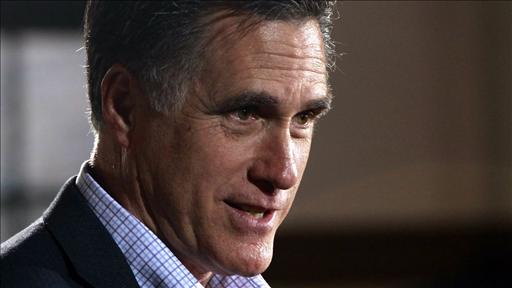Bain Capital Saved America
In the 1980s, the resilient U.S. economy saved itself from becoming Europe. Bain was part of the rescue.
By Daniel Henninger
WSJ.com
Not only did Bain Capital save America, but no
matter what turn Mitt Romney's political career
takes, Bain Capital may stand as the best of Mr.
Romney's lifetime contributions to the nation's
economic well-being. If only he'd tell the story.
We are of course putting forth "Bain Capital" as not merely the Romney private-equity house but as the stand-in for the period of American economic history that ran from 1980 to 1989. Back then it was called the Greed Decade, with asset-stripping barbarians at the gate. Virtually everything about this popular stereotype is wrong. Properly understood, the 1980s, including Bain, were the remarkable years when an ever-resilient America found a way to save itself from becoming what Europe is now—a global has-been.
After centuries of First World status—and all the perquisites of prestige and power that came with it—Europe is watching its economic status slide inexorably toward new national powers in the East and elsewhere. Because of the modernizing change that Bain and others like it forced on U.S. corporations in the 1980s, we are not fading. Not yet.
Standard & Poor's credit downgrades aren't the biggest news about Europe's fallen status. A larger historic change became clear in the first two weeks of 2012, as national treasuries brought sovereign debt issues to market. The new world order was made plain in a Jan. 12 Wall Street Journal headline: "Reversal of Fortune in Debt Market." The story told how global investors who routinely bought the debt of Italy or Spain were now buying the 25- and 30-year bonds of Indonesia, Brazil, the Philippines, South Africa and other so-called "emerging market" nations.
Pimco global fund manager Curtis Mewbourne was explicit about the changing of the global guard in Barron's this past weekend: "There are a couple of very important changes going on. One, which is pretty broadly accepted, is that we are seeing a very significant shift of economic importance, away from the developed economies into the developing economies."
Read through S&P's justification for last week's downgrades of nine European countries. Along with the expected dumping on those countries' fiscal profligacy, one finds as well a blunt recognition of Europe's moribund "fundamentals," meaning their ability to produce "strong and consistent" economic growth.
If not for Bain Capital and the other, bigger players who commenced a decade of leveraged buyouts and hostile takeovers in the 1980s, the odds are that the U.S.'s "fundamentals" would be similarly weak. Instead, the U.S. corporate sector remade itself during the Bain years.
In a comprehensive 2001 re-examination of the buyouts and takeovers of the 1980s, economists Bengt Holmstrom of MIT and the University of Chicago's Steven Kaplan made clear (as have others) that the results were far from the stereotype of zero-sum pillage revived last week by economic historian Newt Gingrich and un-Texan Gov. Rick Perry ("vulture capitalism"), and sure to be promoted in grainy, tear-soaked campaign ads by the Obama team.
"When large-scale hostile takeovers appeared in the 1980s," Messrs. Holmstrom and Kaplan write, "many voiced the opinion that they were driven by investor greed; the robber barons of Wall Street had returned to raid innocent corporations. Today, it is widely accepted that the takeovers of the 1980s had a beneficial effect on the corporate sector and that efficiency gains, rather than redistributions from stakeholders to shareholders, explain why they appeared."
Arguably, the primary force that set off the 1980s upheaval in U.S. corporate restructuring was the deregulation begun by Jimmy Carter and continued by Ronald Reagan. Airlines, ground transportation, cable and broadcasting, oil and gas, banking and financial services all experienced regulatory rollback. Meanwhile, a competitive, globalized marketplace was rising. Management at some of America's biggest companies, confused by these rapid changes, found themselves sitting on huge piles of unused or poorly deployed cash and assets.
Thousands of Mitt Romneys allied with huge pension funds representing colleges, unions and the like, plus a rising cadre of institutional money managers, to force corporate America to reboot. In the 1980s almost half of major U.S. corporations got takeover offers.
Singling out this or that Bain case study amid the jostling and bumping is pointless. This was a historic and necessary cleansing of the Augean stables of the American economy. It caused a positive revolution in U.S. management, financial analysis, incentives, governance and market-based discipline. It led directly to the 1990s boom years. And it gave the U.S. two decades of breathing room while Europe, with some exceptions, choked.
Every voter seems to sense that finding the answer to what comes next for America's economic fortunes makes this election huge. The Washington Post-ABC poll just out produced an extraordinary 57% disapproval of the economic stewardship of Barack Obama, whose life goal seems to be to reverse the policies of 1980-2000.
Mr. Romney's answer appears to be that voters want to keep hearing about him and his management résumé. Voters don't want one man's story. They want someone who understands how the next 10 years can produce an American economy that offers the opportunities for them that the 1980s produced for Mitt Romney.
Write to henninger@wsj.com



